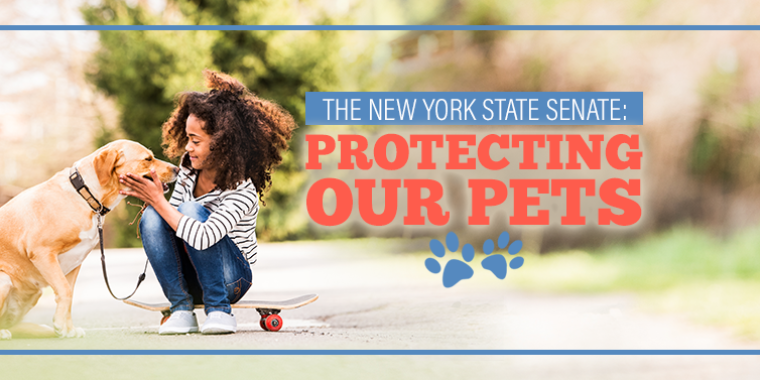
Senator Phillips Announces Package Of Animal Protection Measures Passes State Senate
June 7, 2018

Senator Elaine Phillips announced today that the New York State Senate passed a package of measures, which she supported, that strengthen protections for animals and their owners from harm and abuse as part of this week’s Animal Advocacy Day. The bills eliminate the predatory practice of pet leasing, strengthen Buster’s Law, crack down on animal fighting, and toughen penalties for theft of companion animals, among other measures.
“Pets can complete our families and fill our homes with joy, companionship and happiness – and we have an obligation to protect and provide them a safe and healthy living environment,” Senator Phillips said. “This legislative package not only protects our animals, but punishes those who harm them by cracking down on pet leasing, strengthen penalties for dog fighting and increasing the fine for abandoning an animal. I applaud my Senate colleagues for passing these important measures and I urge Governor Cuomo and the Assembly to take them up. This is the least we can do for our pets that do so much for us.”
The bills passed include:
Prohibiting the leasing of dogs and cats
S7415C: Eliminates the predatory practice of leasing dogs and cats for ownership. Pet leasing is a practice that preys on people who cannot always afford a companion animal. Many do not understand they are entering into a lease agreement for an animal for multiple months. In
the process, these individuals are forced to pay far more than they realized.
Toughening penalties for the theft of a dog or cat
S1256: Establishes the theft of dogs and cats as grand larceny in the fourth degree in certain cases. This helps law enforcement with difficulties in determining the dollar value of stolen pets.
Prohibiting violators of “Buster’s Law” from having a companion animal
S2501: Would prohibit a person convicted of “Buster’s Law” from owning or possessing a companion animal unless authorized by court order, after appropriate psychiatric or psychological testing. Requiring a psychiatric evaluation will help identify behavior problems and ensure more animals are not abused.
Creating Kirby & Quigley’s Law:
S1680A: Would expand the definition of aggravated cruelty to animals to include harm to companion animals during the commission of a felony. Violating this measure would be punishable with two years in jail and a $5,000 fine.
Toughening penalties for dog fighting and cruelty to animals
S1712: Increases certain penalties for violating the prohibition of animal fighting and for aggravated cruelty to animals, plus requires psychiatric evaluation/treatment for those committing the crime of Aggravated Cruelty to Animals.
Increasing the fine for abandoning an animal
S1137: Would increase the fine for animal abandonment from $1,000 to $2,000. This would help prevent abandoned animals from starving or freezing to death, breeding, spreading disease, or being killed by other animals.
Designating animal fighting as an enterprise-crime-eligible offense
S594: Would define animal fighting as a criminal act when referring to enterprise corruption. By making animal fighting an enterprise-crime-eligible offense, law enforcement and prosecutors will have more tools available to combat this serious problem.
Increasing the penalty for multiple convictions of animal cruelty
S299: Would increase the penalty to a felony for multiple convictions of torturing, killing, or failing to provide sustenance to an animal, if convicted within five years from the date of a prior conviction. This will also help protect people as well because animal cruelty is often linked to violence against humans.
Strengthening the penalty for animal cruelty in the presence of a child
S728: Increases the potential term of imprisonment from two to four years when animal cruelty is committed in the presence of a child. Committing such acts in front of a child inflicts psychological damage on the minor who is forced to witness these crimes. They can also permanently imperil a still-developing minor's sense of judgment and ethical conduct.
The bills will be sent to the Assembly.
The animal advocacy measures build upon the Senate’s commitment to protecting pets and other wildlife. The 2018-2019 state budget includes $5 million for the Companion Animal Capital Fund. This builds upon funding secured last year by the Legislature – the first of its kind - to provide humane societies, not-for-profits, and municipal shelters with grants for capital projects through a competitive application process. In addition, measures the Senate has already passed this year include:
Establishing microchip standards for companion animals
S7317: Establishes microchipping standards for companion animals, requires animal facilities to check animals for identifying marks, and requires such facilities to notify owners if they are in possession of an animal they believe to be missing or stolen. (Chapter 36)
Making it easier for pet owners to evacuate in the event of an emergency
S7112: Allows domestic companion animals to be permitted to board the Port Authority's or any other public transportation or public transportation service in the event of a state of emergency and evacuation. It would be consistent with current emergency operation plans pertaining to the needs of animals and individuals with an animal under their care, and is needed to effectuate a recently enacted New Jersey law providing the same protections to residents of both states. It is a reasonable, common sense approach to public and animal safety by making it easier for pet owners to evacuate to safety. (Passed both houses)
Preventing animal abusers from working at animal shelters
S2937: Prohibits persons convicted of animal cruelty from being a dog or animal control officer, or working at an animal shelter, pound, humane society, animal protective association, or Society for the Prevention of Cruelty to Animals.
Criminalizes bringing a minor to an exhibition of animal fighting
S1432: Would criminalize knowingly causing a minor to attend an exhibition of animal fighting. It can be extremely harmful for children to witness animal fighting. It not only damages their emotional development, but often leads the child to become abusive, anti-social, less empathetic, and desensitized to abhorrent social behavior.
Extending orders of protection to pets of victims of domestic abuse
S2167: Would give the court discretion to forbid contact between the abuser and any pet that is cared for by a victim.
Exempting dog license fees for deployed active military members’ dogs
S839: Would allow municipalities the option to waive a licensing fee for an active military member's dog when they are deployed.
Share this Article or Press Release
Newsroom
Go to Newsroom

Senator Phillips' Community Update 3-10-17
March 10, 2017

Making Clean Water Albany’s priority
March 8, 2017